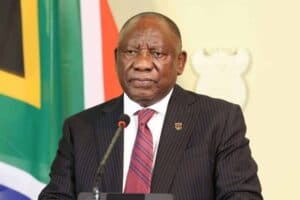The party is seeking a Constitutional Court order because the President was 'untruthful' when he was questioned about cadre deployment.

The Democratic Alliance (DA) is gunning for President Cyril Ramaphosa in its fight against “cadre deployment“.
The DA has written to the chairperson of the Commission of Inquiry into Allegations of State Capture, Acting Chief Justice Raymond Zondo, requesting that he consider laying perjury charges against Ramaphosa.
The party is seeking a Constitutional Court (ConCourt) order against the President for “misleading” the commission during his testimony on 28 April 2021.
“Ramaphosa denied that the ANC’s cadre deployment committee sought to influence appointments to the judiciary. After he initially denied that the appointment of judges was ever even discussed,” DA MP Leon Schreiber said in a statement on Monday.
Schreiber argued that Ramaphosa’s denial was “untruthful” in light of the ANC’s deployment committee minutes, which was made public two weeks ago.
ALSO READ: Minutes show how ANC predetermined appointment of judges, SOE heads, boards
The minutes, from 2018 to 2021, appear to show how the ANC ran a parallel deployment process to fill certain positions at several government departments, agencies and the boards of state-owned enterprises (SOEs).
According to the minutes from a meeting held on 22 March 2019, the committee preselected the appointment of judges for vacant posts in the judiciary.
The ConCourt at the time had two vacant positions, while the Supreme Court of Appeal (SCA) had one.
But Ramaphosa defended the ANC’s policy of deployment of its members into the public service during his testimony.
The President argued the policy was an important part of implementing the ANC’s mandate.
He also indicated that the deployment committee did not keep records of its meetings from 2012 to 2017.
Using Zuma as precedent
Schreiber said the minutes show how the ANC interferes in the appointment of judges, saying it “threatens to create a constitutional crisis”.
“It is simply untenable that, instead of protecting our country’s constitutional order by telling the truth and undertaking to end cadre deployment, the sitting President of the Republic seemingly chose to mislead the Commission in order to protect the ANC,” he further said.
READ MORE: ANC’s cadre deployment strategy comes from the National Party
“When Zondo directly approached the [ConCourt] seeking an order of contempt against [former president Jacob] Zuma, he created an important precedent that any person who sought to undermine the work of the State Capture Commission would be held liable, with Zuma ultimately being sentenced to a 15 month prison sentence.
“It is critical that the Commission uphold this principle by applying the same standard and mechanism of directly approaching the [ConCourt] in this case of apparent perjury by Rampahosa,” the DA MP continued.
He added that there is an ample legal precedent for Zondo to approach the ConCourt to hold Ramaphosa accountable.
Last week, the DA called for parliamentary debate over ANC’s cadre deployment minutes as well as the state capture report.
No-confidence motion
Ramaphosa is also facing a motion of no confidence, first tabled by African Transformation Movement (ATM).
The motion targeted Ramaphosa’s leadership in February 2020 over the sealing of his bank statements related to his 2017 campaign for the ANC presidency, among other things.
The party has since resubmitted their motion of no confidence application to Parliament.
This came after a Supreme Court ruling delivered in December 2021. ATM was granted leave to appeal the Western Cape High Court’s judgement in the Supreme Court.
The High Court previously ruled in favour of former National Assembly Speaker Thandi Modise, who decided not to grant the ATM’s request to hold the no-confidence motion by way of a secret ballot.
ALSO READ: Open ballot for Ramaphosa no-confidence vote ‘defies logic’, says ATM president
The party sought to have Modise’s decision reviewed and set aside.
However, the Supreme Court found that Modise misunderstood her discretion on the secret ballot.
In its judgement, the appellate court ordered that the ATM’s request be resubmitted to the new Speaker of the National Assembly, Nosiviwe Mapisa-Nqakula, for reconsideration.
ATM, which only has two seats in Parliament, wants the Speaker to decide whether the no-confidence motion should be voted on through a secret ballot or by an open vote.
The party had asked that the vote on the motion be held as soon as Parliament reconvenes on 25 January this year.
Additional reporting by Thapelo Lekabe






